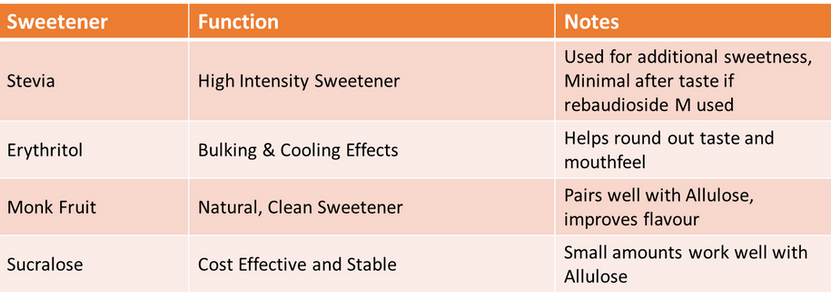

Allulose "THE NEXT SUGAR"




25kg Bag or 1000kg Bulka Bag
Allulose is a low-calorie sweetener with the same sweet taste and texture as table sugar.
Allulose is often referred to as a “Rare Sugar” due to its discovery in small quantities in nature. Allulose is also unique in its Nutritional Profile – it shares the typical structure of a carbohydrate but only contributes a fraction of the calories and does not raise blood sugar levels.
Allulose is naturally present in small quantities in a variety of sweet foods like caramel sauce, maple syrup and brown sugar also found in certain fruits including jackfruit, figs and raisins. A monosaccharide, or simple sugar, allulose is absorbed by the body, but not metabolized so it is nearly calorie-free.
ALLULOSE - THE BENEFITS OF USE
1. Sweetener
Allulose provides about 70% of the sweetness of sucrose (table sugar), with a similar taste profile
"Clean and No Bitterness".
2. Low Calorie
It has ~0.2 kcal/g (vs 4 kcal/g for sugar), making it attractive for diet or reduced calorie beverages.
3. Bulking Agent
Unlike high-intensity sweeteners (like sucralose or stevia), Allulose has physical bulk, improving mouthfeel.
4. Sugar Reduction Strategy
Often used in combination with other sweeteners (e.g., erythritol, stevia, monk fruit) to achieve the desired sweetness and texture without sugar.



REGULATORY NOTES - FSANZ
Food Standards Australia New Zealand (FSANZ) has granted approval for Allulose (D-allulose) as a novel food. This approval permits its use in several food categories, notably:
-
Non-alcoholic water-based flavoured beverages: up to 3.5%
-
Yogurt: up to 5%
-
Ice cream: up to 5%
-
Confectionery (excluding chocolate): up to 5%
-
Desserts (with or without gelatine): up to 10%
-
Bakery products: up to 10%
This regulatory change allows manufacturers to incorporate allulose into sugar-reduced and sugar-free products, offering consumers alternatives with lower caloric content.



ALLULOSE - KEY FUNCTIONAL PROPOERTIES
Allulose offers the following key function properties to your product: -
-
TASTE: Clean sugar-like taste - No Aftertaste
-
SOLUBILITY: Highly soluble in water (~70% at room temp)
-
STABILITY: Heat and Acid Stable – suitable for Hot-Fill or Pasteurized Beverages
-
COLOUR: Non-caramelising unlike sucrose – so it stays clear
-
CALORIE CONTRIBUTION: ~0.2 kcal/g (95% less than sugar)
ALLULOSE - BLENDING WITH OTHER SWEETENERS
To match Full-Sugar Sweetness (12° Brix) use Allulose in a combination with:


Example combination (per litre):
Allulose: 30g
Stevia: 50–100 ppm
Citric acid: ~0.2% (adjust for flavour and pH)
Flavour: as required

ALLULOSE - FORMULATION TIPS
Use the following Formulation Tips to assist your Calorie Controlled Product
-
Acid balance: Use citric or malic acid to bring out fruity flavours and support microbial safety.
-
Mouthfeel: Allulose gives more body than high-intensity sweeteners but less than sugar - consider glycerine or fibres if needed.
-
Foam control: Allulose does not promote foaming; good for carbonated drinks
This regulatory change allows manufacturers to incorporate allulose into sugar-reduced and sugar-free products, offering consumers alternatives with lower caloric content.
ALLULOSE - LABELLING
FSANZ has ruled that Allulose be declared as follows: -
-
Declare: as “D-allulose” or “allulose” in the ingredient list
-
Not Added: Allulose is NOT INCLUDED as ‘added sugar’ under FSANZ labelling rules
-
Included: Allulose still must be listed in total carbohydrate


Allulose is ideal for use in Low-Calorie - Soft Drinks / Flavoured Waters / Functional Beverages / RTD Teas
-
Use in low-calorie sodas, flavoured waters, functional beverages, and RTD teas.
-
Use in combination with acidulants (citric acid, phosphoric acid) is compatible.
-
Typical usage: 1%–3.5% w/w, depending on the desired sweetness and drink type.
-
FSANZ Limit (Australia): Up to 3.5% in non-alcoholic water-based flavoured beverages
That equals 3.5g per 100ml, or 35g per litre




Allulose is Ideal for use in Ice-Cream
Allulose is a natural, low-carb sugar that tastes like regular sugar. Allulose significantly depresses the freezing point of frozen products, similar to fructose and high-fructose corn syrup (HFCS). Allulose is stable during freezing conditions, so can be used very successfully in frozen products, such as frozen desserts and ice cream. Allulose adds bulk and texture to ice cream. Allulose dissolves easily for no gritty texture and has a different freezing point and allows the ice cream to stay softer.


Allulose is ideal for use in the Bakery Industry
-
Allulose improves the freshness of yeast baked goods and reduces food waste.
-
Allulose leads to earlier starch gelatinization and slows down retrogradation.
-
Burger buns with allulose stay longer moist but have a lower a w -value.
-
Sensory tests confirmed the improved freshness of Allulose baked goods.
-
DSC analyses and sensory studies show the advantages of Allulose over sucrose and fructose.
25kg Bag
Allulose is a low-calorie sweetener with the same sweet taste and texture as table sugar. Allulose is often referred to as a “Rare Sugar” due to its discovery in small quantities in nature. Allulose is also unique in its Nutritional Profile – it shares the typical structure of a carbohydrate but only contributes a fraction of the calories and does not raise blood sugar levels.
TASTE: Clean sugar-like taste - No Aftertaste
SOLUBILITY: Highly soluble in water (~70% at room temp)
STABILITY: Heat and Acid Stable
COLOUR: Non-caramelising unlike sucrose – so it stays clear
CALORIE CONTRIBUTION: ~0.2 kcal/g (95% less than sugar)
USES: Food Production - Non-alcoholic Beverages, Yoghurt, Ice Cream, Confectionery, Desserts & Bakery Products
